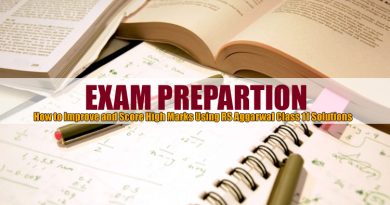What Are The Important Topics In Class 12 Physics?
In today’s world, technology is at the forefront of everything. This technology that is now running the world has its fundamentals rooted in Physics. Physics is a subject that has far-reaching, diverse applications in the real world. If one truly understands Physics and learns to love the subject, the career opportunities for him or her are endless. The subject is exciting and offers a plethora of new information, just waiting to be unravelled. For a student of class 12, Physics is also a core subject that forms a huge part of the syllabus for boards and various competitive exams alike.
If one aims to attain excellence in the subject, shortcuts cannot be taken. You have to truly understand each concept that is presented to you to develop cohesive knowledge of the subject. However, in such a short span of time and with exams just waiting to pounce upon students, it becomes essential to not just study hard, but study smart. Knowing the important chapters in class 12 Physics can help you know which portions of the syllabus need to be prioritized immediately. This is why we will provide you with a comprehensive list of the most important topics and chapters that are part of Class 12 CBSE NCERT Physics.
Also Read: 14 Important Tips for Effective Revision
Important Topics of Class 12 Physics
The entire Physics syllabus consists of 9 units and 14 chapters in total but not all of these are important from the point of the examination. The syllabus is quite vast but via the means of this article, we shall only discuss Class 12 Physics chapters that hold a lot of weightage marks-wise.
Unit– I: Electrostatics
This entire unit is extremely important. It helps form the core of many higher-level engineering branches too. The first chapter starts with a discussion on charge and its conservation, Coulomb’s law-force between 2-point charges, forces between multiple charges, the well-known superposition principle, and so on. Conduction and insulation are taught alongside capacitance and dielectric polarisation on which questions are frequently asked in both viva and theory exams. Students are even asked to calculate potential at different points in relation to different scenarios. Simple numericals are asked from this unit in board exams. On the other hand, competitive exam aspirants can expect much tougher questions. The 2 chapters that are part of this unit are:
- Chapter–1: Electric Charges and Fields
- Chapter–2: Electrostatic Potential and Capacitance
Unit – II: Current Electricity
This unit comprises a single chapter on Current Electricity but that does not diminish its importance. In fact, it only amplifies it. Ohm’s law and its parameters are discussed in great detail. Topics like resistance, resistivity, carbon resistors and their colour coding are patent questions. Alongside this, numerical problems are also often set on the formula involving a combination of resistors. This combination can either be a series combination or a parallel combination. Various formulas and derivations on electrical energy and power are also taught. Potential difference is commonly asked too, as part of both short and long answers.
- Chapter–3: Current Electricity
Unit III: Magnetic Effects of Current and Magnetism
An introduction to electromagnetism is provided in chapter 4. This can be a relatively difficult unit for students to navigate as they are not familiar with these concepts. A magnetic field is explained in basic terms by means of Oersted’s experiment and the Biot – Savart law. Ampere’s law’s applications are taught but they are not very practical in real life as they are limited to infinitely long straight wires. The force on a current-carrying conductor in a uniform magnetic field is calculated using some constants and some variables along with the force between two parallel current-carrying conductors.
- Chapter – 4: Moving Charges and Magnetism
- Chapter – 5: Magnetism and Matter
Unit VI: Optics
This is probably the single most important unit in the whole Physics syllabus. After recapitulating the fundamental principles of reflection and refraction, we move on to newer topics like the working of a telescope. Power of a lens, Young’s double-slit experiment, Huygen’s principle, etc. are all topics questions are set on.
- Chapter – 9: Ray Optics and Optical Instruments
- Chapter – 10: Wave Optics
Unit IX: Electronic Devices
This is a rather interesting unit that gives students an insight into modern electronic devices. Diodes and transistors are discussed along with their working mechanism and principle. To understand these concepts, basics like energy bands in metals, nonmetals and metalloids are also talked about. Diagrammatic representations are provided.
- Chapter–14: Semiconductor Electronics: Materials, Devices and Simple Circuits
Also Read: 5 Essay Writing Problems ESL Students Struggle With in Dubai
Tips To Score More
Do not be afraid to ask for help – Teachers are there to guide you. You should always be able to look up to your teacher in case you require any additional help. You can ask them about important chapters, the kind of questions that will come, and the best ways to complete the syllabus in the allotted time. Teachers will be able to guide their students appropriately before any examination as they have a lot of experience in these matters. In case you do not understand something, do not shy away from asking for help from them and approach them directly.
Familiarise yourself with the pattern of the paper – You must always be aware of the exact marking scheme of the question paper you are going to sit for. The pattern for board exams and other competitive exams is quite different. Having a clear idea about the kind of questions that will come will enable you to manage time efficiently. If you go for an exam without doing any research beforehand, you may end up making a lot of mistakes that could have easily been avoided otherwise.
Try to stay as calm as possible – We all know about the fight or flight response that is elicited from our bodies when we are put in a troubling situation. If you lose your cool, you can mess up your paper despite knowing all the answers. To get the best results in your examination, you must try to stay as relaxed as possible. Breathing exercises have proven to be useful here.




